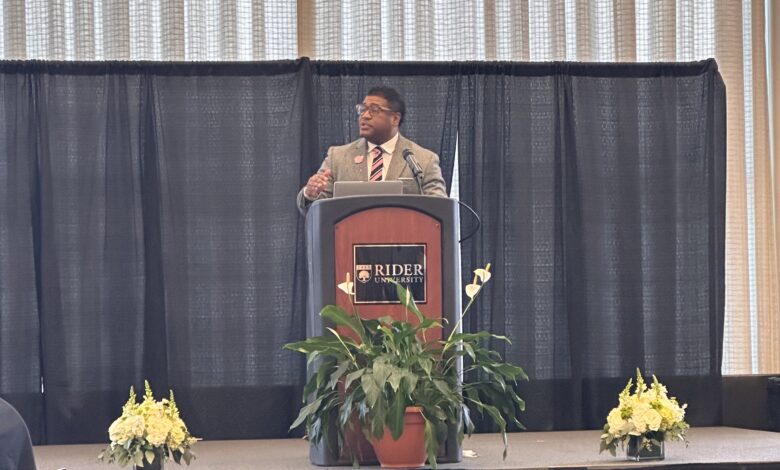
Specialist visits campus to assess Rider’s DEI work
By Amethyst Martinez
As Rider looks to adjust to a new dynamic in diversity, equity and inclusion initiatives after the departure of the top three DEI figureheads this summer, Damon Williams, a DEI specialist, looked into Rider’s past four years of diversity work, assessing where it has grown, but also, where it can improve.
During his end-of-September visit, Williams hosted events for the university community to become more familiar with his DEI work, including a keynote speech and student workshop with polls that will be used in the overall assessment of the university.
“One of the things that excited me about this residency is the chance to engage in a manner … where I’m not just … giving a lot of speeches, but I’m actually getting a chance to listen,” said Williams in his keynote speech on Sept. 27
Williams previously visited campus in 2019, his trip consisting of an introduction to and reinforcement of DEI ideas at Rider. For context, Rider’s first-ever Chief Diversity Officer Barbara Lawrence, who was among those that left the university in the summer, was first hired in 2021, two years after Williams’ visit.
Since then, DEI has become a key pillar in the university’s structure, but it has faced major challenges, too.
This summer, along with Lawrence’s departure, Center for Diversity and Inclusion Director Pamela Pruitt also resigned, and Leanna Fenneberg, former vice president of student affairs, had her position eliminated during cost-saving initiatives.
Since then, Lawrence’s and Pruitt’s roles have been combined and given to CFO Heeyoung Kim, along with her prior duties at the university.
Student Government Association President Naa’san Carr’s focus during his campaign was DEI initiatives, and he felt hesitant after their departures in the summer.
“I’m hopeful for now, but, in the back of my mind, I’m still wondering, is this the right move?” said Carr. “How’s it going to affect our student experience?”
This year’s visit
In 2023, four years after his initial visit, Williams was gathering information on Rider’s DEI initiatives and where they stand now. While researching the university’s DEI structure, Williams profiled two things: where the university flourished in terms of DEI, but also, where changes can be made.
“It’s really about me listening, understanding and hearing,” said Williams in an interview with The Rider News. “I’m generating my insights, and then offering my recommended actions.”
Along with the 2023 two-day residency at Rider, documents were given of DEI accomplishments at Rider over the past four years.
The assessment has not been released yet as Williams and his team work on their results.
Williams’ keynote speech
Williams covered plenty in his address, from certain governing officials blocking DEI in universities, his work in justice, equity, diversity and inclusion, otherwise known as JEDI, and how faculty, staff, students and administrators must work together to achieve DEI harmonies.
Williams’ visit aligned with a time period of DEI pushback in the U.S., especially in the higher education sector.
Universities across the country–more specifically in the majority red states–have faced extreme backlash in DEI initiatives, with states like Texas and Florida banning DEI offices at public colleges.
“Thank goodness we’re at a private institution [that] offers a different type of insulation,” said Williams in his keynote address. “It’s not about whether your president and your provost [are] committed when the legislature creates new laws at public institutions.”
He also discussed JEDI, an expanded term coined for DEI that adds justice to the conversation of inclusion. He attributed the change to the Black Lives Matter movement at the height of the pandemic, and mentioned Black people killed at the hands of police brutality in the U.S., such as George Floyd, Breonna Taylor, Sandra Bland, Trayvon Martin, Freddie Gray and more.
“For some, it was the first time in their life that they had a personal connection, and moved across our country in ways that we had not seen it before,” said Williams.
Obstacles like tech troubles and a bird flying across stage couldn’t stop Williams from emphasizing his final point of the speech: the importance of letting all voices be heard and being an upstander.
“To be a great ally, you got to be a scholar of these issues … and I’m not just talking about publications,” said Williams. “We’re talking about as an understanding. What are the DEI topics that make the hair on the back of your neck stand up, because they cause you to feel unsafe? You gotta know what’s going on. If you don’t know, it can’t work.”


